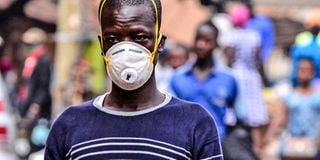Covid-19: When to wear face mask

Precaution. A man wearing a mask walks on Namirembe Road in Kampala on March 26. WHO has revised guidelines on masks. PHOTO BY ABUBAKER LUBOWA
What you need to know:
- Face mask. The World Health Organisation says if one is healthy, the mask is only needed when taking care of a person with suspected Covid-19 infection or when one is coughing or sneezing.
- In the guidelines published on Monday, the world health body upheld that whereas masks could limit the spread of coronavirus, they are deficient without other recommended measures.
As the coronavirus pandemic continues to spread across the world, face masks are on high demand as a preventive measure against the spread of the virus.
After Uganda confirmed its first Covid-19 case last month, the public quickly picked up wearing of face masks.
On the onset of the Covid-19, the World Health Organisation (WHO) issued guidelines on the use of face masks. These guidelines have been echoed by health experts.
Dr Julius Lutwama, the deputy director of Uganda Virus Research Institute (UVRI), says one should wear a mask when infected to prevent droplets, which would spread the virus.
Other measures
Dr Lutwama adds that although many Ugandans are using masks, they should be used when one is in a place that is thought to be highly infected such as isolation centres or hospitals.
This is echoed by the revised WHO guidelines on masks following statistics from Hong Kong indicating that prevalent use of masks by the public may have reduced the spread of Covid-19.
In the guidelines published on Monday, the world health body upheld that whereas masks could limit the spread of coronavirus, they are deficient without other recommended measures.
Dr Lutwama reaffirms this: “In areas where there is no infections, masks should be left for health workers. After all, they are in short supply. If the general population is taking them, they would be taking what the health workers would use when in proximity with people who are suspected to be with the virus."
According to WHO, if one is healthy, the mask is only needed when taking care of a person with suspected Covid-19 infection but also when one is coughing or sneezing.
The Centers for Disease Control and Prevention has, however, changed its policy and advises that everyone should cover their face with a mask or cloth covering whenever social distancing is difficult to maintain.
Dr Mukuzi Muhereza, the secretary general of Uganda Medical Association, however, says one does not need a mask when walking on streets but the mask mostly prevents one from touching the three inlets - mouth nose and eyes.
“When the hands touch somewhere where there are droplets of the virus, this mask will stop you from touching the face so it will act as a barrier between you and the face,” Dr Muhereza said.
WHO warns that masks are effective only when used in combination with frequent hand cleaning, or use of alcohol-based hand rub or soap and water, and that one must know how to use it and dispose of it properly.
Dr Muhereza adds that health workers should wear masks to protect themselves but also prevent droplets from spreading to patients.
Cloth masks
Many business people have used the coronavirus outbreak to make cloth masks, which are cheaper but how effective are they?
Dr Daniel Semakula, the innovations and knowledge officer at the College of Health Sciences, Makerere University, says effectiveness of the mask depends on the purpose, material and weaving, among others.
He says cloth masks may not necessarily be effective in regards to viruses, but they reduce the droplets that one would spread.
“…they can have a role in reducing the droplets...when it comes to layers, it goes back to the material...,” Dr Semakula says.
Dr Lutwama says cloth masks are ideally not the best because clothes get wet very easily, which exposes one to the risk of infection.
“When they get wet, anything that falls on the other hand of the mask will easily filter through and get into the mouth of the person putting it on,” he says.
However he said cloth masks may give some kind of protection depending on the number of layers. UVRI cautions that when one wears a cloth mask, it doesn’t guarantee protection against the virus, especially when in crowded places such as markets.
Dr Lutwama said WHO does not recommend cloth masks.
How to use a mask
• Before putting on a mask, clean the hands with alcohol-based hand rub or soap and water.
• Cover mouth and nose with mask and make sure there are no gaps between your face and the mask.
• Avoid touching the mask while using it; if you do, clean your hands with alcohol based hand rub or soap and water.
Replace the mask with a new one as soon as it is damp and do not reuse single use masks.
• To remove the mask: remove it from behind (do not touch the front of mask); discard immediately in a closed bin; clean hands with alcohol based hand rub or soap and water.
Source: WHO
[email protected] media.com



